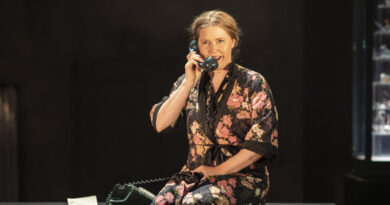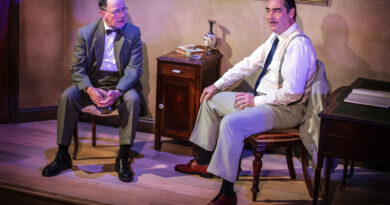“The Solitude Monologues”, Euroregional Theatre Festival in Timisoara – TESZT
Jeremy Malies in Romania
30 May 2024
“No quote from Schopenhauer ever raised a penis.” Well, the authors of the Kinsey Report stressed the many ways in which an act of congress can be ignited and quite a few are sketched out here. But you would guess that playwright Mona Donici is on safe ground with her assertion.

Ilona Fall. Photo credit: Beliczay László.
Imagine a set of Alan Bennett “Talking Head” monologues combined with the film Magnolia but with the latter’s Aimee Mann soundtrack replaced by Erik Satie. That is a fair idea of scope if not tone here. Director Kocsárdi Levente drip-feeds us information and initially I thought we were in a single big asylum with the inmates showing solidarity one with another, but Donici is recreating individual loneliness in which people often imagine they have companions.
Most touching (and convincing) is Ilona Fall as an 84-year-old grande dame of the theatre. Her star has waned and, hard up, she vegetates on the fourth floor of a stinking elevatorless Communist apartment, even telling us ruefully that there is now a Facebook group for people in her predicament.
Demented, she stares out of the flats endlessly and examines the vegetation, at one point imagining that she is a giraffe. With an inspired touch, videographer Sebastian Hamburger switches the viewpoint of his projections so we are indeed at tree level, putting us inside the woman’s head as Florian Zeller does with his elderly characters.

Photo credit: Beliczay László.
The span of this work is huge. All of the characters capture my interest (you sense that Levente has helped the performers explore character from within) but I choose to focus on the monologues that truly seduced me. Aida Olaru is a demented anorexic media influencer. Donici’s gently ironic approach sees her stressing that the ostensibly most connected character with no doubt legions of digital friends on Instagram, is in fact crushed by her loneliness. The script explores big truths through apparently mundane details.
Serena Voaideș plays “Trois Gymnopédies” stage left. She improvises and also plays as an accompaniment to music coming from the sound system. The monologues all have serious socio-economic points to make but I’m back with Fall and her repetition of the detail that the Japanese government has an office for policy on loneliness and isolation. Characters are in private hells brought on by loneliness which sees them watch movies on HBO and Epic over a thousand times and (my own notion of hell fire) Alain Delon singing “Strangers in the Night” on hard repeat.
Set by M.C. Donici can be interpreted as you wish. Video projection is against two piles of cardboard boxes. Is this an economy in set design or does it represent garbage outside the flats of the monologists? A Miss Haversham character stuck in her wedding dress opens up her world of hurt to us. Unlike Dickens’s creation, she can take it off but puts it on for every anniversary of an abortive engagement. Quite deliberately, The Solitude Monologues are unremittingly dark despite the abundance of good jokes. This is presumably the backdrop that Donici thinks best fits the urgent socio-economic points she wishes to make. And she scores with all of them. It’s didactic theatre that avoids preaching. Impressive.









